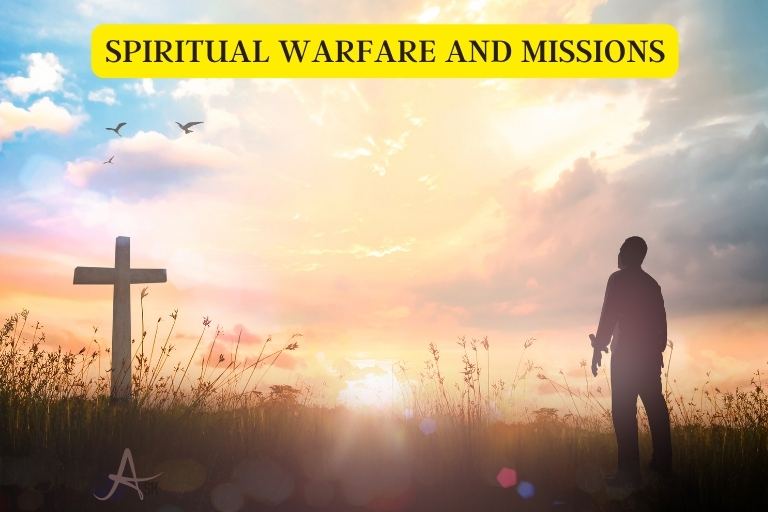Spiritual Warfare And Missions: Interconnected Concepts!
Spiritual warfare and missions are interconnected concepts in Christianity, where believers engage in active spiritual battles against the forces of evil while spreading the Gospel to unreached people groups worldwide.
Spiritual warfare refers to the struggle between good and evil, as Christians believe they are called to fight against the spiritual forces of darkness (Ephesians 6:12).
This warfare occurs in various aspects of life, including personal faith, relationships, and engaging with the spiritual needs of those around us.
Missions, on the other hand, is the organized effort of believers to share the message of Jesus Christ with the unreached people groups and communities across the globe.
Spiritual warfare and missions come together when Christians face opposition, persecution, or challenges while spreading the Gospel.
Christians participating in missions often encounter various forms of spiritual warfare in their work, such as resistance from local spiritual practices, cultural barriers, and opposition from authorities.
Missionaries must rely on the power of prayer, the guidance of the Holy Spirit, and the support of the global Church community to help them persevere through these challenges and remain faithful in their mission to share the love of Christ with all people.
Spiritual Warfare and Missions Table:
| Aspect | Spiritual Warfare | Missions |
|---|---|---|
| Purpose | To engage in spiritual battles against the forces of darkness that hinder human progress and deter the spread of the gospel. | To spread the message of the Christian faith and make disciples in all nations, fulfilling the Great Commission. |
| Key Themes | Prayer, discernment, spiritual authority, the Armor of God, strongholds, and deliverance. | Evangelism, discipleship, humanitarian aid, church planting, and engaging with unreached people groups. |
| Tactics | Intercessory prayer, fasting, spiritual mapping, corporate prayer gatherings, and spiritual warfare conferences. | Preaching, teaching, relationship-building, community outreach, medical clinics, and relief projects. |
| Scripture | Ephesians 6:10-18, 2 Corinthians 10:3-5, 1 Peter 5:8-9, James 4:7, Colossians 2:15 | Matthew 28:18-20, Mark 16:15, Acts 1:8, Romans 10:13-15, Luke 10:1-12 |
| Challenges | Misconceptions about spiritual warfare, discerning between spiritual battles and personal struggles, and the potential for spiritual warfare to distract from evangelism. | Delays in progress, cultural barriers, language barriers, financial constraints, persecution, and the potential for mission work to lead to dependency or imperialism. |
| Tools | Prayer, worship, Bible study, discipleship, spiritual gifts, and authority in Christ. | Bible translation, cross-cultural training, church partnerships, mission teams, and discipleship materials. |
| Impact | Breakthroughs in spiritual strongholds, increased spiritual growth for individuals and communities, and influence in the spiritual realm. | Growth of the global church, transformed lives, development of indigenous church leadership, and lasting partnerships between churches and mission organizations. |
Key Takeaway

Four Facts About Spiritual Warfare and Missions
Introducing Spiritual Warfare And Missions
Spiritual warfare and missions are two distinct concepts, yet they are interconnected. Spiritual warfare involves combating the spiritual forces of darkness, which are the sources of our struggles on earth. However, missions also play a crucial role in spiritual warfare as it involves spreading the gospel and bringing people to the knowledge of Christ. By understanding spiritual warfare, missionaries can be better equipped to engage in effective spiritual battle while sharing the message of hope and salvation. This understanding allows them to recognize the spiritual strongholds in different cultures and effectively combat them through prayer, fasting, and the power of the Holy Spirit.
On the other hand, missions refers to spreading the gospel message to the world.
In this section, we will introduce and explain these two concepts and how they intersect.
What Is Spiritual Warfare?
Spiritual warfare is a spiritual conflict that refers to the battle between good and evil. It involves fighting against the forces of darkness, which may be invisible but are very real.
Here are some key points you should know about spiritual warfare:
- Spiritual warfare is a spiritual battle fought with spiritual weapons.
- Christians are in a constant state of battle against the enemy, who seeks to steal, kill, and destroy.
- Spiritual warfare involves resisting the devil and his schemes through the power of the holy spirit.
- Spiritual warfare is a call to action for christians because it’s not just about our lives, but the lives of others who we can influence.
What Are Missions?
Missions refer to spreading the gospel message to people across the globe. It’s the act of sharing the good news of jesus christ, making disciples, and planting churches.
Here are some of the key points that explain what missions are:
- Missions are a commandment of jesus christ to spread the gospel to all nations.
- Missions involve going to new places and sharing christ’s message with people who haven’t heard or accepted it yet.
- Missions involve meeting the physical, emotional, and financial needs of the communities in which missionaries work.
- Missions require sacrifice and commitment, as it’s a long-term process that involves building relationships and sharing christ’s love.
How Do These Two Concepts Intersect?
Spiritual warfare and missions intersect in the following ways:
- Missions require spiritual warfare to be successful because we are engaging in a battle with the enemy’s territory.
- Spiritual warfare is necessary to overcome the spiritual strongholds that hinder the spread of the gospel message.
- Missions help expose the enemy’s tactics by sharing the gospel message, which can bring light to people’s lives.
- Prayer is a critical aspect of both spiritual warfare and missions. Prayer is essential as it empowers missionaries and helps them overcome obstacles they may face.
Understanding spiritual warfare and missions is crucial for christians everywhere. Both concepts may initially seem separate, but they intersect in ways that make them more effective together.
It’s essential to be equipped with knowledge about spiritual warfare and missions to fulfill the great commission wholeheartedly.
The Importance Of Understanding The Intersection
Spiritual Warfare And Missions: The Importance Of Understanding The Intersection
As a missionary, understanding the intersection of spiritual warfare and missions is critical to carrying out the great commission effectively.
Spiritual warfare refers to the ongoing battle between good and evil, with the devil seeking to hinder the spread of the gospel.
Therefore, a thorough understanding of spiritual warfare and how it impacts missions is essential.
How Spiritual Warfare Impacts Missions
The impact of spiritual warfare on missions cannot be underestimated. Missionaries face various kinds of spiritual opposition, which can negatively affect not only their effectiveness but also their personal well-being.
Here are some ways in which spiritual warfare impacts missions:
- Physical harm: Missionaries face different risks, including persecution, violence, and natural disasters.
- Emotional and spiritual struggles: Missionaries often report feeling lonely, overwhelmed, and discouraged as they face challenges and opposition in their ministry.
- Hinderance of the gospel: The devil seeks to hinder the spread of the gospel and may use different strategies, including deception and false teachings.
The Role Of Missions In Spiritual Warfare
Missions plays a significant role in spiritual warfare. The gospel is the power of god for salvation to all who believe.
Therefore, missions, which involves spreading the gospel, is a powerful tool in the battle against the forces of darkness.
Below are some ways in which missions plays a role in spiritual warfare:
- Evangelism: Sharing the gospel with people who have never heard it is an essential part of missions, and it plays a significant role in breaking down spiritual strongholds.
- Discipleship: Discipleship involves nurturing new believers in their faith and equipping them to make disciples themselves. This process is critical in building up the church and advancing the kingdom of god.
- Prayer: Prayer is a powerful weapon in the battle against the enemy. Missions involves praying for people and nations, which can break down spiritual barriers and open doors for the gospel.
The Significance Of Spiritual Warfare In Missions
Understanding spiritual warfare and its significance in missions is critical for every missionary. Missions involves more than physical work.
It requires spiritual preparedness and the ability to discern the spirit behind the different challenges that may arise.
Here are some reasons why spiritual warfare is significant in missions:
- Protection: Spiritual warfare helps missionaries to be aware of the different risks they may face and how to protect themselves against the enemy’s attacks.
- Power: Spiritual warfare equips missionaries with the necessary spiritual weapons to fight against the different forces of darkness they may encounter.
- Effectiveness: Understanding spiritual warfare helps missionaries to carry out their work with greater effectiveness, as they are more discerning of the spiritual realm.
Understanding the intersection of spiritual warfare and missions is critical for every missionary.
This knowledge equips them to face the different challenges and opposition they may encounter in the course of their work effectively.
Identifying Potential Challenges
Spiritual Warfare And Missions: Identifying Potential Challenges
Spiritual warfare is a reality that cannot be ignored, particularly in missions. Missionaries who are unaware of this battle and its challenges can face significant struggles.
Identifying the potential challenges of spiritual warfare is crucial to prepare missionaries for the opposition that awaits them.
In this section, we will examine the nature of spiritual warfare and how it affects missions work.
Understanding The Nature Of Spiritual Warfare
Spiritual warfare is a battle between the forces of good and evil, between god and the devil. Every christian is in this fight, whether they know it or not.
It is a struggle against the rulers, against the authorities, against the powers of this dark world and against the spiritual forces of evil in the heavenly realms (ephesians 6:12).
Here are some key points to understanding the nature of spiritual warfare:
- Spiritual warfare is a reality that all christians must face.
- Satan is the adversary, but god has already won the battle.
- Prayer and dependence on god are essential to victory.
How Spiritual Warfare Affects Mission Work
Missionaries are on the frontlines of spiritual warfare. They are sent out to share the good news with the world, but they will inevitably face opposition.
Satan will do everything in his power to prevent the spread of the gospel, to discourage missionaries, and to destroy their faith.
Here are some key points to understanding how spiritual warfare affects mission work:
- Satan does not want the gospel to be preached, and will use any means necessary to stop it.
- Missionaries are often faced with intense spiritual attack.
- Faith and dependence on god are essential to victory.
Spiritual warfare is an ever-present reality that missionaries must face. Identifying the potential challenges of spiritual warfare is crucial to prepare missionaries for the opposition that awaits them.
Understanding the nature of spiritual warfare and how it affects mission work is essential for effective ministry.
Overcoming The Challenges
Preparing Oneself For Spiritual Warfare In Missions
One of the most critical aspects of engaging in spiritual warfare is preparing oneself adequately beforehand.
The following points can help to develop the necessary mindset, resilience, and clarity of purpose required for effective spiritual warfare in missions:
- Regular bible reading and study can help to build a strong spiritual foundation. The bible is a rich source of information on spiritual warfare, providing guidance on how to overcome challenges and persevere in the face of adversity.
- Prayer is essential in preparation for spiritual warfare. Prayer helps to create an atmosphere of communication with god, facilitating the sensitivity necessary to hear god’s voice and discern his instructions.
- Staying connected to a supportive community can contribute significantly to an individual’s ability to prepare for spiritual warfare. Fellowship with like-minded individuals provides encouragement, shared experiences, and a sense of accountability.
- Fasting is another practical way to prepare for spiritual warfare in missions. Fasting helps to augment spiritual discipline, focus, and concentration, which are all necessary components for effective spiritual warfare.
Building Resilience And Spiritual Strength
Resilience is an essential characteristic of any successful missionary engaging in spiritual warfare.
Being spiritually strong involves maintaining a strong relationship with god, relying on his word, and being prepared to face any challenge that comes one’s way.
Here are some ways to foster resilience and spiritual strength:
- Grounding oneself in god’s love is a critical component of building resilience and spiritual strength. Knowing that god loves you and that his love is unchanging, irrespective of external circumstances, helps to provide a sense of stability and security.
- Maintaining focus on god’s word helps to reinforce biblical truths and values. The bible contains numerous stories of individuals who demonstrated remarkable resilience in the face of adversity, providing valuable insights and lessons for current-day believers.
- Focusing on priorities is essential when building resilience and spiritual strength. Developing a clear understanding of god’s purpose and mission helps to cultivate a sense of direction, focus, and perspective that enables spiritual warriors to stay focused and grounded at all times.
Identifying Safeguards And Support Systems
Identifying safeguards and support systems is key to ensure that any missionary engaging in spiritual warfare does not become overwhelmed or burnt out.
Here are some ways to identify safeguards and support systems:
- Establishing and maintaining healthy personal boundaries is paramount when engaging in spiritual warfare. It is essential to prioritize rest and self-care, taking time out to recharge mentally, physically, and spiritually.
- Developing a support network is an important aspect of identifying safeguards and support systems. Having a community of like-minded individuals who understand the challenges of spiritual warfare helps to provide essential encouragement, advice, and prayer support.
- Seeking regular accountability is another way to identify safeguards and support systems. Having an accountability partner or mentor helps to provide a sense of guidance, clarity, and support in navigating the challenges of spiritual warfare.
Spiritual Warfare Strategies
In spiritual warfare and missions, strategies play an essential role in achieving victory against the enemy.
These are the things you should do to overcome the challenges that will come your way:
- Recognizing the enemy: In spiritual warfare, identifying the enemy is the first step towards winning the battle. Knowing the nature and tactics of our opponent will enable us to have a clear understanding of our mission and better prepare ourselves for the fight.
- Fighting spiritual battles in a missions context: Doing missions work comes with its own set of spiritual warfare challenges. As missionaries, we need to stay vigilant against the attacks of the enemy and trust in god’s protection. We should always put on the armor of god and be ready to fight the spiritual battles that come our way.
- Developing spiritual disciplines: Our spiritual growth is vital to our effectiveness in spiritual warfare. Engaging in spiritual disciplines such as prayer, bible reading, fasting, and worship helps us to stay focused and grounded in our relationship with god. These practices enhance our intimacy with god, strengthen our faith, and provide us with the power to overcome the enemy.
Spiritual warfare is an ongoing battle that requires a strategic approach to overcome the enemy. Recognizing the enemy, fighting spiritual battles in a missions context, and developing spiritual discipline are essential strategies that we should incorporate into our lives to achieve victory against the enemy.
Remember, nothing is impossible for god, and with him, we can overcome any challenge that comes our way.
Success Stories And Lessons Learned
Spiritual warfare in missions can be a challenging experience, but when missionaries fight with the weapons of god’s word, prayer, and faith, they can make an immense impact on the lives of people.
In this section, we will explore the success stories and lessons learned by experienced missionaries.
Real-Life Examples Of Successful Spiritual Warfare In Missions
- Breaking drug addiction in india: In india, a christian missionary team came across a village infested with substance abuse problems. They used the power of prayer and god’s word to break the chain of addiction. Over time,
- There was a significant transformation: People started forming life groups and gathering together to study the word of god.
- Defeating witchcraft in africa: A team of missionaries was evangelizing in east africa, and they discovered that people had deep-rooted beliefs in witchcraft. They confronted the situation with prayer, fasting, and teaching the word of god. With time, people started understanding that they didn’t have to rely on the spirits of nature; they could rely on the almighty god. There was a significant decrease in the prevalence of witchcraft in the region.
- Breaking generational curses in south america: In many remote amazonian tribes, there are deep-seated curses that date back generations. A team of missionaries came in and taught the indigenous people about jesus christ and the power of his blood. They showed them that through faith and prayer, they could break the chains of generational curses. Slowly but surely, they began to see transformations in individual personal lives, families, and even entire villages.
Lessons Learned From Experienced Missionaries
- The importance of preparation: Preparation is vital before engaging in spiritual warfare in missions. One must have a thorough knowledge of the people, culture, environment, and language. Without proper preparation, missionaries could face unexpected obstacles that could jeopardize their evangelization goals.
- Steadfast faith in god: When going through spiritual warfare, it is essential always to remember that god is in control. When missionaries have unwavering faith in god, it makes all the difference.
- Effective prayer and fasting: Prayer and fasting are powerful weapons in spiritual warfare. Missionaries should prioritize prayers and fasting and partner with intercessors around the world as they fight spiritual battles.
- The power of the word of god: The bible is the living word of god, and through it, missionaries can win spiritual warfare. Teaching the truth from the word of god is crucial, whether it be in bible studies, sermons, or personal conversations.
- Disciplining new converts: When new believers come to christ, they require proper discipleship. Missionaries must be patient, caring, and willing to guide new believers as they grow in faith.
Spiritual warfare in missions is not an easy task. It requires preparation, steadfast faith in god, effective prayer and fasting, sharing the wisdom of scriptural truth, and patience when disciplining new converts.
By following the examples of experienced missionaries, one can become better equipped to face spiritual battles and continue engaging in missions.
Biblical Perspective
Theological Basis Of Spiritual Warfare
Spiritual warfare is a biblical concept that refers to the ongoing battle between god and satan for the souls of humankind. The bible teaches that this conflict is real and that we all have a role to play in it, as believers in jesus christ.
Here are some key points to consider when studying the theological basis of spiritual warfare:
- Spiritual warfare is rooted in the reality of sin and evil in the world.
- Satan is a real and active enemy, seeking to deceive, tempt, and destroy us.
- God has given us spiritual weapons to fight against the enemy, including prayer, fasting, the word of god, and the power of the holy spirit.
- The battle is ultimately won through the victory of jesus christ on the cross.
Understanding The Authority And Power Of Jesus Christ
Jesus christ is the ultimate authority in spiritual warfare. He has the power to overcome all evil forces and to give us victory in every battle.
Here are some key points to keep in mind when studying the authority and power of jesus christ:
- Jesus is the son of god, fully divine and fully human.
- He died on the cross to redeem us from sin and death.
- He conquered death and the grave through his resurrection.
- He has given us the authority to use his name in prayer and to declare his victory over the enemy.
- The power of the holy spirit is available to us to help us live victoriously in christ.
The Role Of The Holy Spirit
The holy spirit is our guide and helper in spiritual warfare. He empowers us to pray, to resist the devil, and to walk in the victory of jesus christ.
Here are some key points to consider when studying the role of the holy spirit:
- The holy spirit is the third person of the trinity, fully god.
- He was sent by jesus to guide us into all truth and to empower us for ministry.
- He helps us to pray, interceding for us when we do not know what to pray.
- He gives us spiritual gifts to build up the body of christ and to advance the kingdom of god.
- He provides the power and wisdom we need to walk in victory over the enemy.
Historical And Cultural Perspectives
Spiritual Warfare In The Context Of Different Cultures
Spiritual warfare is a concept that is universal to different cultures, but its interpretation can vary.
Here are some key points to note:
- In african cultures, spiritual warfare is believed to be against malevolent spirits that possess individuals.
- In native american cultures, spiritual warfare is interpreted as a battle against negative energies that bring physical, spiritual, and mental ailments.
- In asian cultures, spiritual warfare is viewed as a struggle against evil forces that can lead to misfortune and disease.
- Christians view spiritual warfare as the battle between good and evil, and the role of prayer and spiritual weapons is emphasized.
Lessons Learned From Historical Missions Work
Historical missions work has taught us a lot about spiritual warfare.
Here are some key points:
- Missionaries had to learn the cultural and religious context of the people they wanted to evangelize to avoid misunderstandings and respect their customs.
- It was discovered that prayer and fasting are powerful spiritual weapons in a spiritual battle.
- Collaboration between missionaries was essential to amplify the effectiveness of spiritual warfare.
- Compassion and love are crucial in spiritual warfare, and it’s necessary to show sensitivity to people’s needs and avoid imposing faith on them.
It’s crucial to note that spiritual warfare is a complex concept that requires a deep understanding of the cultural and religious beliefs of the people you want to evangelize.
Through learning from historical missions, we can adapt and effectively engage in spiritual warfare.
Developing Best Practices
Spiritual Warfare And Missions: Developing Best Practices
Missions work is not for the faint of heart. It requires dedication, passion, and a deep connection with spirituality. One of the most overlooked aspects of mission work is spiritual warfare. When engaging in mission work, the devil will always try to hinder progress and success.
Missionaries need to be equipped to defeat the enemy in these situations. Here are some best practices for developing a missions strategy that incorporates spiritual warfare.
Developing A Missions Strategy That Incorporates Spiritual Warfare
- Start by connecting with other missionaries in your area.
- Research bible passages that address spiritual warfare and prayerfully consider how to apply those teachings.
- Seek guidance from religious leaders/experts in spiritual warfare.
- Set goals and benchmarks for progress in spiritual warfare.
- Regularly involve prayer and visualizations in your spiritual warfare plans.
Building Relationships And Support Systems
- Create strong relationships with other missionaries, churches, and other support systems.
- Regularly communicate with your support system, sharing both the ups and downs of your work.
- Look for opportunities to connect with locals and develop long-term relationships with them.
- Stay connected with family and friends from your home country for emotional support.
- Cultivate a healthy work-life balance to avoid burnout and maintain positive relationships with those around you.
Balancing Personal Safety With Risks Involved In Mission Work
- Prepare for potential risks and danger before embarking on mission work.
- Research and plan for any safety concerns in your area (e.g., crime, natural disasters, etc. ).
- Stay aware of local customs and norms to avoid inadvertently putting yourself in harm’s way.
- Regularly check-in with your support system and let them know about any potential risks.
- Remember to prioritize personal safety in all aspects of mission work, while also understanding that risks are inherent in this line of work.
By developing a missions strategy that incorporates spiritual warfare, building strong relationships and support systems, and prioritizing personal safety while balancing the risks of mission work, missionaries are better equipped to succeed in their work.
It is essential to prepare for and overcome any challenges encountered on the mission field, including spiritual warfare.
Remember to persevere, stay connected with your support system, and never forget your ultimate mission to spread love and hope to those in need.
How Do Tattoos Play a Role in Spiritual Warfare and Missions?
Tattoos and spiritual connection are significant in various cultures and religious contexts, often symbolizing a deep-rooted spiritual journey or commitment.
In the realm of spiritual warfare and missions, tattoos can serve multiple roles:
- Identity and Belonging: They can signify a person’s identity or association with a particular spiritual community, serving as a visible commitment to their beliefs.
- Protection and Power: Some believe tattoos have protective qualities or can confer strength, aiding in spiritual battles.
- Testimony and Evangelism: Tattoos can open doors for sharing personal testimonies or initiating conversations about faith, especially in cross-cultural missions.
Tattoos are more than skin deep; they often carry profound spiritual meanings and can be powerful tools in the expression of faith and engagement in spiritual warfare.
FAQ About Spiritual Warfare And Missions
What Is Spiritual Warfare?
Spiritual warfare is the battle between good and evil in the spiritual realm.
Why Is Spiritual Warfare Important In Missions?
Spiritual warfare is important in missions because it helps missionaries overcome obstacles and spiritual opposition.
How Can Missionaries Engage In Spiritual Warfare?
Missionaries can engage in spiritual warfare through prayer, fasting, and relying on the power of the holy spirit.
What Are Some Examples Of Spiritual Warfare In Missions?
Examples of spiritual warfare in missions include overcoming language barriers, cultural differences, and opposition from spiritual forces.
Conclusion
As we conclude, it is apparent that spiritual warfare plays a crucial role in missions. It is important to understand that our battle is not against flesh and blood, but against the spiritual forces of darkness.
We need to put on the armor of god and stand firm in our faith as we engage in the work of missions.
Our success depends on our reliance upon god’s strength and wisdom as we seek to fulfill the great commission.
As we navigate through the challenges of missions, let us remember that we have been given the authority and power to overcome the enemy through the blood of jesus christ.
Therefore, let us continue to pray for one another, encourage each other, and remain vigilant in our fight against the enemy.
May god’s grace and wisdom guide us as we strive to make disciples of all nations.






